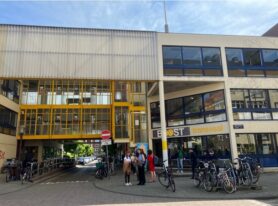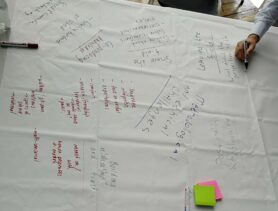News
Reflexivity and informed consent: methodological considerations from the HERA Conference in Amsterdam
MIGFOODCITY student assistant Lucia Terzuolo (UCU) participated in the HERA Final Conference Refugee Youth, Public Space and Artistic Practice. In this blog posts, she shares what she learned about research methodologies, which she will apply to her work on the MIGFOODCITY project.
Reflexivity and informed consent are some of the words that still echo into my mind after the HERA conference. Participating as a student, I found the workshop on qualitative methods particularly stimulating and informative. The correct and ethical execution of methods is a recurring theme in scientific research. But what exactly can be defined as correct when referring to qualitative methods? This question sparked a passionate discussion at the conference, as qualitative methods are often chosen by scholars researching refugee youth and the use of public space from a range of different social disciplines. The MIGFOODCITY project also uses qualitative methods in the form of interviews to research the intersections between food, migration and public space. The workshop I had the opportunity to attend at the conference might offer some answers, if not raise further questions.
The researcher: Reflexivity practices

outside BOOST, the community organisation that hosted the conference
One important takeaway I could gather as a student concerns the importance of engaging in the continuous practice of reflexivity while conducting research. As argued by Hesse-Bibber (2007), the goal of reflexivity is maintaining the awareness in the researcher of their own positionality: “Reflexivity is a self-critical action hereby the researcher finds that the world is mediated by the self” (p. 495). This means that our knowledge is created through our own selves, positioned in terms of race, gender, and class, and is therefore dependent on our past experiences. Reflecting before, during, and after entering the space of an interview is crucial for an ethical execution of qualitative methods, as it uncovers the ever-present implicit relations of power arising from one’s positionality.
In this sense, ‘ethical’ methodologies envisage the distribution of power between the interviewer and the participant, so as to prevent their positionality from creating a hierarchical relationship. As part of the MIGFOODCITY project, several interviews will be carried out in Utrecht. Given the scope of the research, the positionality of the participants will likely include a range of migration backgrounds. For this reason, it is of first importance for the interviewer to engage in self-reflexivity in order to limit as much as possible the implicit bias arising from their positionality and past experiences.
The research participants: Informed consent

brainstorming during the workshop
The ethical responsibility of researchers is not fulfilled by engaging in reflectivity practices; rather, it permeates the relationship with the researched. As discussed by several speakers at the conference, this starts with informed consent, meaning a deliberate decision by the participant to take part in the research after receiving appropriate information about it. Although consent is normally discussed before the interview takes place, the debate at the conference’s workshop demonstrated it should actually happen throughout the research process. In checking with the participant throughout the process, the researcher paves the way for building a relationship of trust and confidentiality.
This is especially important when conducting research that involves co-creation, which entails a multidirectional and interactive process of production of knowledge by the participant and the interviewer, where it is crucial for the former to be fully aware and consensual. It is such a relationship of trust that the students and researchers working on the MIGFOODCITY project aim to build with the participants, so as to also explore possibilities of co-creation.
Why are these methodological and ethical challenges worth reflecting upon for researchers? Conducting responsible and ethical research is not only a prerequisite for high-quality research, but a necessity in order to avoid harmful and extractive practices. Therefore, other researchers and myself in MIGFOODCITY have to be attentive to our positionality and practice reflexivity, as well as treat informed consent as a process and not just a tick box exercise prior to the fieldwork.
Bibliography
Hesse-Bibber, S. N., & Piatelli, D. (2007). Holistic reflexivity: The feminist practice of reflexivity. na.
Methodological workshop, Refugee Youth, Public Space and Artistic Practice’ HERA Conference. Boost, Amsterdam. June 3rd, 2022.
UK Research and Innovation (UKRI). Consent. https://www.ukri.org/councils/esrc/guidance-for-applicants/research-ethics-guidance/consent/
Vázquez Melken, Rolando. University College Utrecht. Qualitative Inquiry in Everyday Life lectures.

